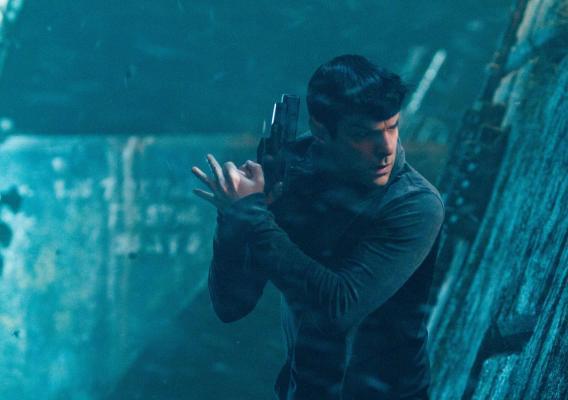As a fellow—though not Completist-level—Trekkie, I found much to admire in Matt Yglesias’s consideration of the entire filmed catalog of Star Trek. He’s correct that the fundamental spirit of the fictional universe is one of progressive humanism (if not, in my opinion, utopian idealism). But if that stuff is Star Trek’s soul, its brain, at best, is hard-core, unapologetic sci-fi geekery. It’s the kind of thing that requires an awesome correction like this to Yglesias’ piece: “This article originally referred to proton torpedoes rather than photon torpedoes.” In Star Trek (as in particle physics), the distinction between protons and photons is no pedantic quibble; the entire structure of the universe depends on it! The joy of Star Trek has, for me, always been the show’s scientific—and, more often, pseudo-scientific—patina. And this, unfortunately, is precisely the element that J.J. Abrams’ new Trek films are lacking.
To be fair, 2009’s Star Trek was dependent on two sci-fi concepts: a “temporal incursion” that leads to the creation of an alternate timeline and a mysterious substance called “red matter” that has the power to create planet-gobbling black holes. But for Abrams, these vague gestures are merely a means to his action-packed, dramatic ends, rather than intriguing mysteries to be explored in their own right. As Yglesias notes, the time-travel gambit was really just a way of clearing the Trek slate so that the director didn’t have to stay true to a narrative universe he doesn’t have a strong affection for anyway. Sadly, Into Darkness continues this anti-sci-fi trend. It’s a great action film, but there’s little techie magic. A “transwarp beaming device” is briefly mentioned, as is a cold-fusion gadget that can freeze volcanoes mid-eruption. But what Kirk and crew toy with most are fancy guns.
My dorky dissatisfaction may be impractical, of course. When pitching Star Trek to as general an audience as possible, a director will be forced to play down the geekiness of the various TV series in favor of a more straightforward shoot-’em-up-in-space, with perhaps a gloss of post-9/11 politics. But watching Into Darkness earlier this week, my mind drifted during the repetitive onslaught of video-game-like battle sequences back to my first contact with the Trek universe, the unfairly maligned Voyager iteration. I yearned for a minute or two of Captain Janeway calmly discussing a curious spatial anomaly in the astrometrics lab or hypothesizing about an unexplained burst of tachyon particles from a nearby nebula with Seven of Nine. I smiled thinking of the episode where Jason Alexander plays an alien genius in charge of a galaxy-roving “think tank” of similar prodigies for hire—and got goose bumps recalling the Voyager finale, in which a future Janeway uses a time-travel device to come back and convince her younger self to use a Borg transwarp conduit to get her crew home.
In short, I miss the techno-babble (Trekno-babble?) that gave Voyager and the other Trek iterations their distinctive cadence. Watching Abrams’ reboot I do not get the sense that this is a special universe with a logic and set of pseudo-scientific assumptions that feel familiar while remaining distinct from our own. As a teenager, Voyager’s ethos of curiosity whetted my appetite for real science and technology, spurring me to get a telescope and to spend my summers reading Stephen Hawking and Brian Greene. As it has for so many others, Star Trek inspired in me a love of both science fiction (which carried through to spiritually similar shows like the Stargate franchise and the recently departed and much-missed Fringe) and actual—and sometimes equally fantastic—research.
Sadly, Into Darkness doesn’t even try to have that effect. Its preference for violence and political intrigue makes Abrams’ vision more Star Wars than Star Trek—which renders his closing use of the classic, soul-stirring promise “to explore strange new worlds, to seek out new life and new civilizations, to boldly go where no man has gone before” ironically bittersweet. Something tells me that Abrams’ crew will be approaching those new worlds and new life forms with phasers in hand far more often than tricorders.
